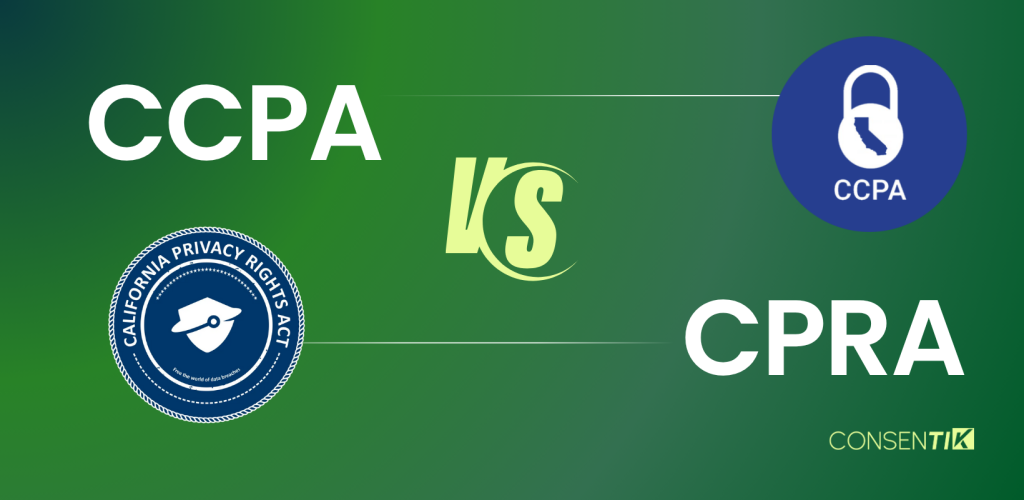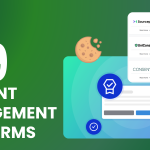California’s CCPA vs CPRA regulations impact over 39 million residents and thousands of businesses handling consumer data. The CCPA, effective since 2020, introduced key privacy rights, while the CPRA, fully enforceable in July 2023, expanded these protections with stricter rules and a new enforcement agency. With fines reaching $7,500 per violation, businesses must adapt or risk penalties. This article will show you the differences,and similarities of these laws —and why compliance matters.
CCPA vs CPRA: What You Need to Know
Both the California Consumer Privacy Act (CCPA) and the California Privacy Rights Act (CPRA) aim to protect consumer privacy, but the CPRA takes things a step further. It expands consumer rights, tightens business obligations, and creates a dedicated enforcement agency to ensure compliance.
Here’s a quick breakdown of how the two laws compare:
| Aspect | CCPA | CPRA |
|---|---|---|
| Effective Date | January 1, 2020 | January 1, 2023 (fully enforceable July 2023) |
| Applicability | Businesses with $25 million+ in revenue, or those handling 50,000+ consumer records or data annually | Applies to businesses meeting the same thresholds, but extends to 100,000+ consumer records; includes new rules for employees and B2B data |
| Enforcement Authority | California Attorney General | California Privacy Protection Agency (CPPA) |
| Consumer Rights | Right to know, delete, opt-out of data sale | Adds rights to correct, limit, and access broader data categories (e.g. sensitive data) |
| Opt-Out Rights | Opt-out of data sales only | Extends opt-out to data sharing, targeting advertising |
So, basically, the CPRA builds on the CCPA by closing loopholes, introducing stricter privacy protections, and shifting enforcement to a dedicated agency. If your business handles consumer data in California, compliance just gets more complex.
CCPA vs CPRA: What Are The Similarities?
The CCPA vs CPRA are both designed to protect consumer privacy by giving people more control over their personal data. While the CPRA introduces new rules, it builds on the same foundation as the CCPA. Here’s where the 2 laws align:
- Consumer Rights: Both laws ensure that consumers can:
- See what personal data a business has collected about them.
- Request that their data be deleted.
- Opt out of the sale of their personal information.
- Business Responsibilities: Under both the CCPA and CPRA, businesses must:
- Disclose the types of personal information they collect and how they use it.
- Maintain a clear privacy policy that explains consumer rights.
- Include a “Do Not Sell My Information” so consumers can opt out of data sales.
- Treat consumers fairly—no penalties for exercising their privacy rights.
The Difference Between CCPA and CPRA
The CCPA was the first major privacy law in California, but the CPRA made the rules even stricter. It created a new enforcement agency, increased fines for violations, and added stronger protections for sensitive data. Businesses now have more responsibilities and must follow tighter privacy rules to stay compliant and avoid penalties. Here’s a closer look at what’s different.
New Consumer Rights Under The CPRA
The CPRA builds on the CCPA by adding rights that didn’t exist before. These rights include:
- Right to Correct Personal Information – Consumers can now ask businesses to fix inaccurate data they have on file. The CCPA only allowed access and deletion, but not correction.
- Right to Limit Use of Sensitive Data – Certain data, like Social Security numbers, financial details, and health information, now fall under a new category called Sensitive Personal Information (SPI). Consumers can restrict how businesses use this information.
- Right to Opt-Out of Automated Decision-Making – Businesses that use AI-driven decisions for things like loans, hiring, or personalized pricing must now give consumers the choice to opt out.
- Right to Data Portability – If a consumer wants to move their personal data from one company to another, they can now request a transfer.
Note: Sensitive Personal Information (SPI) is a separate category that includes:
✔ Social Security numbers
✔ Bank account details
✔ Biometric data (fingerprints, facial recognition)
✔ Precise location tracking
Now, the CPRA introduces a category of Sensitive Personal Information (SPI), which requires stricter protection. Businesses must:
- Get explicit consent before collecting SPI.
- Give consumers the ability to limit their use.
These new rights give consumers even more power over how their data is collected, stored, and used. Businesses must now update their policies and systems to stay compliant.
Stronger Opt-Out Rights
Not only adding more rights, the CPRA also expands existing rights, particularly around how businesses handle consumer data.
- Opting out of data sharing: The CCPA allows people to opt out of data sales, but the CPRA goes further. Now, consumers can also opt out of data sharing, especially when it’s used for targeted advertising.
- Under the CCPA: Consumers could opt out of data sales (where a company sells personal information for profit).
- Under the CPRA: The definition now includes data sharing, meaning businesses must let consumers opt out of having their data shared with third parties, even if no money is exchanged.
- Impact on businesses: Companies that share consumer data with third parties for advertising will need to provide an opt-out option, even if no money is exchanged. This means more transparency and stricter compliance requirements for businesses.
This change has a huge impact on digital advertising since many companies rely on shared data for targeted marketing. Businesses will need to update their privacy policies and consent management tools to comply.
A New Enforcement Agency
One of the biggest changes under the CPRA is the creation of the CPPA (California Privacy Protection Agency) —a dedicated agency focused entirely on privacy law enforcement.
- Under the CCPA: The California Attorney General handled enforcement, but privacy was just one of many responsibilities.
- Under the CPRA: The CPPA takes over completely, meaning stricter oversight, quicker investigations, and tougher penalties for businesses that violate privacy rules.
For companies handling consumer data, this means greater accountability and less room for mistakes.
No More 30-Day Fixes
With the CCPA, businesses got a 30-day grace period to fix violations before facing penalties. That’s gone under the CPRA.
- CCPA: Companies had 30 days to correct violations after receiving notice.
- CPRA: Regulators can impose fines immediately—no second chances.
👉 Key takeaway: Businesses must stay ahead of compliance instead of waiting for warnings.
Stronger Consumer Lawsuits
The CPRA expands consumers’ ability to sue businesses for mishandling their data.
- CCPA: Consumers could only sue for data breaches that exposed personal information.
- CPRA: Now, they can also sue businesses for unauthorized data sharing or sales, especially involving sensitive personal data.
For companies, this means more legal risks—privacy violations could now lead to both lawsuits and regulatory fines.
New Compliance Thresholds
With the CPRA, not every business that has to follow the CCPA will need to comply. The law now raises the threshold, meaning some smaller businesses may no longer be affected.
- CCPA: Applied to businesses processing 50,000+ consumer records/year.
- CPRA: Raises that threshold to 100,000+ consumer records/year.
For small companies, this means they may no longer have to meet compliance requirements. However, larger businesses will now face stricter rules on data retention, security, and consumer rights.
New Third-Party Data Rules
The CPRA tightens control over how businesses share consumer data with third parties.
- Companies must have written contracts when sharing consumer data.
- Contracts must specify what third parties can and cannot do with that data.
Previously, data-sharing practices were more flexible. Now, failing to properly document and regulate these agreements could lead to legal penalties. So, companies must ensure that every partner handling consumer data follows the CPRA’s privacy standards to avoid compliance issues.
Annual Cybersecurity Audits And Risk Assessments
The CPRA now requires businesses to conduct annual cybersecurity audits if their data practices pose a high risk to consumer privacy. Unlike the CCPA, which didn’t have regular security checks, this rule ensures businesses are always evaluating and improving their data protection measures.
Opt-in Rights For Minors
The CPRA strengthens privacy protections for minors by requiring businesses to get explicit consent before collecting, selling, or sharing personal data of anyone under 16 years old.
How this differs from the CCPA:
- The CCPA only required opt-in consent for data sales.
- The CPRA extends this rule to data sharing as well, making it harder for businesses to track minors without approval.
- If a child denies consent, businesses must wait 12 months before asking again.
This ensures that minors have greater control over their data and are not repeatedly pressured to provide consent.
Higher Penalties for Mishandling Children’s Data
The CPRA increases fines for businesses that mishandle children’s data. Even if the mistake is unintentional, businesses face higher penalties:
- Standard violation: $2,500 per incident.
- Violation involving children’s data: $7,500 per incident.
This change reinforces the CPRA’s focus on protecting minors and holding businesses accountable for stricter compliance.
Expanded Consumer Access and Stricter Data Retention Rules
The CPRA gives consumers more access to their personal data and limits how long businesses can keep it. Here is the news:
- Consumers can now request access to 24 months’ worth of data, instead of just 12 months under the CCPA.
- Businesses can only collect data for a specific purpose and must delete it once it’s no longer needed.
What does this mean for businesses?
- Companies must review their data retention policies to stay compliant.
- Privacy policies and data management processes must be updated to meet the stricter rules.
CPRA vs CCPA: Who Needs to Comply?
Not every business falls under these laws, but certain companies must follow the CPRA’s stricter requirements. To determine if your business is affected, ask yourself:
- Does your company collect personal data from at least 100,000 consumers each year?
- Does your annual revenue exceed $25 million?
- Do you sell or share consumer data for targeted advertising?
If the answer is yes to any of these, then compliance with the CPRA is likely required.
How Consentik Can Help?
The CPRA brings stricter rules around data sharing, consumer rights, data sales, user consent and third-party data handling, making compliance more complex for businesses. But Consentik takes the burden off your shoulders. This app makes it easy to stay on top of these changes.
Consentik App helps you ensure your cookie consent process is clear and compliant, so you can focus on your business instead of constantly worrying about privacy regulations. Here’s what this app can do:
- Tracking and Managing User Preferences: Consentik automatically tracks and manages users’ consent for cookies and data sharing, ensuring compliance with privacy laws.
- Third-Party Data Sharing Compliance: Consentik ensures that any third-party integrations for ads, analytics, or marketing are compliant with CPRA rules. It manages consent for these services, protecting businesses from potential violations.
- Up-to-date Privacy Policies: Consentik keeps cookie banners and privacy policies current with automatic updates whenever needed, reducing the risk of outdated compliance practices.
In short, with Consentik’s support, staying compliant with CPRA and CCPA is simple. This app automates consent management, handles third-party data requirements, and ensures that privacy practices are up-to-date—freeing businesses from the complexity of compliance.
CCPA vs CPRA FAQs
Does CCPA only apply to California?
Yes, the CCPA is a California law. It protects the personal information of people who live in California. Even if a company is located outside of California, it must follow the CCPA if it does business in California and meets certain criteria.
Does the CPRA replace the CCPA?
To meet GDPR and CCPA requirements, businesses should only collect the data they truly need and clearly explain how and why it is used. Consumers must have the right to access, manage, and delete their personal information whenever they choose. Strong security measures should be in place to protect sensitive data from unauthorized access or misuse.
Beyond just compliance, businesses should conduct regular privacy assessments, train employees on data protection laws, and stay transparent about their data practices. Following the right to be forgotten where required, ensures consumers have full control over their information. Staying accountable and proactive not only helps businesses comply with the law but also builds trust with their customers.
How do penalties differ between CCPA and CPRA?
The penalties under CCPA and CPRA differ primarily in enforcement authority, scope, cure periods, and private rights of action. Here is a comparison table:
| Criteria | CCPA | CPRA |
| Penalty Amounts | $2,663–$7,988 per violation | Same as CCPA |
| Enforcement | Attorney General | California Privacy Protection Agency (CPPA) |
| Cure Period | Automatic 30-day cure | No guaranteed cure period |
| Private Action | Limited to certain data breaches | Expanded to additional breach scenarios |
| Applicability | ≥50,000 consumers | ≥100,000 consumers |
In summary, CPRA strengthens enforcement and expands consumer rights, while raising the applicability threshold to focus primarily on larger businesses.
Final Words
California’s privacy laws have changed, and businesses need to keep up. The CCPA vs CPRA debate isn’t just about new rules—it’s about how companies handle customer data. The CPRA strengthens protections, adds stricter enforcement, and increases penalties for non-compliance.
If your business collects personal information, now is the time to act. Updating privacy policies and giving consumers more control isn’t just about following the law—it’s about building trust. Companies that wait too long could face serious fines and damage to their reputation.















